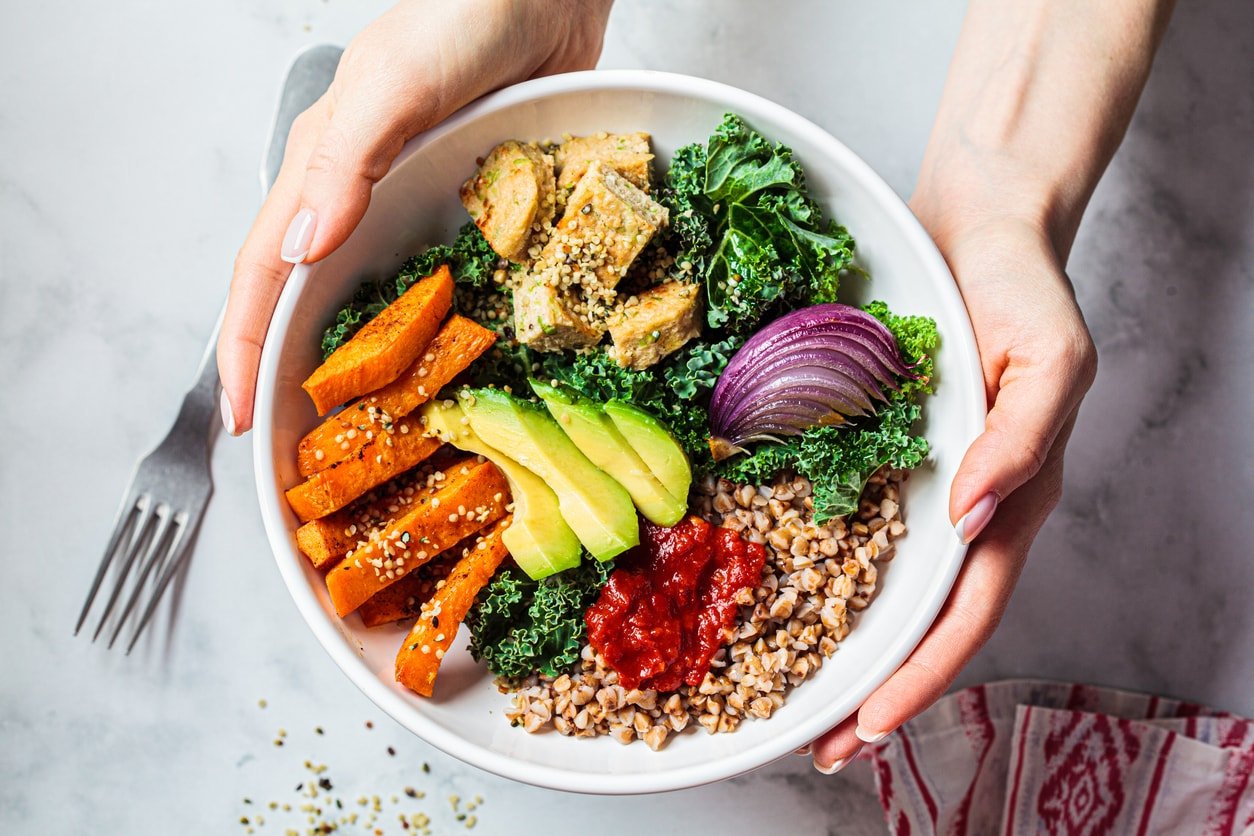Nutritional controversy surrounds eating a vegan diet during pregnancy. Every mom wants the best for their baby, but why should you change how you live just because you’re in a new phase of life? The good news is you don’t. A vegan diet is okay during pregnancy with the help of supplements of some essential nutrients ordinarily found in animal products.
This does not mean all vegan diets are healthy choices for a pregnant mama. Many modern-day vegans fuel their bodies with foods that do not have much nutritional bang for their buck. For example, a high-volume raw vegan lifestyle could cause harm because while it is filled with fresh fruits and vegetables, it lacks protein and omega fatty acids. Another example is a vegan who only eats processed products full of sodium, fillers, and preservatives. Both examples could harm a mother-to-be and her developing baby. This article will discuss the research behind nutrition during pregnancy and how a balanced vegan diet could fit into an expecting mother’s lifestyle. We will also discuss the benefits of eating a vegan diet during pregnancy and foods that benefit a baby’s growth and development.
It’s All About the Nutrients
Throughout pregnancy, your baby grows and develops all its vital organs and nutrient stores to thrive in the outside world. Think about it like a butterfly. If there are deficiencies, they will never grow their wings and be able to leave their cocoon and fly. The same goes for babies. If they do not gain the nutrients from their mom’s diet, they could struggle in their first days of life, develop congenital disabilities, or have a low birth weight.
Research has also found that a mother’s deficient micronutrients throughout pregnancy can predispose their baby to chronic diseases, including obesity and insulin resistance.1 There are also stages of pregnancy in which the baby needs more of one nutrient and less of another. The general recommendation to combat this is to consume more calories later in pregnancy and take a prenatal supplement as suggested daily. But what are the requirements, and how does this affect those following a vegan diet during pregnancy?
Recommended Nutrients
The U.S. dietary guidelines from the federal government focus on four primary nutrients for pregnancy: folic acid, iodine, choline, and iron. All of these are often found in a daily prenatal supplement.2
Folic Acid
Folic acid is critical for preventing severe congenital disabilities in the spine and brain of a baby.2 It is commonly found in foods like broccoli, legumes, and dark leafy greens. This is a plus for those who are well-rounded vegans because their diets would typically include these foods.
Iron
Another essential nutrient during pregnancy is iron because it allows the baby to develop correctly and prevent deficiencies outside the womb.2 Breast milk contains no iron, so moms must meet their recommended daily allowance, or RDA, to ensure their child does not become deficient. This nutrient is tougher for vegans to meet their RDA because it is readily found in red meat, poultry, and fish.
Iodine
Iodine is the next essential nutrient required during pregnancy, and prenatal supplements may not have enough of it. It is found in fish, dairy, and eggs, making it especially difficult to achieve as a vegan.
Choline
Finally, choline helps your baby’s brain develop properly.2 Choline is found in eggs and legumes, making getting your RDA feasible as a vegan.
Is a Vegan Diet Healthy During Pregnancy?
So, what does the research say regarding a vegan diet during pregnancy, and can it be healthy? Scientists have suggested that although vegan and vegetarian lifestyles are often associated with a risk of nutrient deficiencies, a well-planned vegan diet can be effective during pregnancy.3 Research has shown that an expecting mother should follow a strategic plan to avoid undernutrition and impaired fetal growth for a successful pregnancy.3
Prenatal Vitamins are Crucial
Prenatal vitamins are recommended by all doctors and can play a crucial role for vegans during pregnancy. However, prenatal vitamins are not all created the same. Therefore, vegans should take more of the essential nutrients they lack, often iron and iodine, to compensate for the missing pieces in their diets. For example, iron is poorly absorbed when not paired with vitamin C.4 This comes into play when women drink coffee or tea instead of eating breakfast and taking their vitamins. Although there has not been much research showing this evidence, we can conclude that many vegans may not absorb the correct amount of vitamins and minerals when they take their prenatal supplements.
Support is Vital
So, is it healthy to eat a vegan diet during pregnancy? Yes, it can be if you seek proper nutrition intervention from a professional. Some vegans choose unsupported pregnancies, in which they see no professional medical guidance. This can be an unhealthy choice because of the possible congenital disabilities that can harm a child’s quality of life.
If a mother chooses to see doctors, take her prenatal supplements regularly, and see a dietitian or nutrition professional regarding specific foods to include in their diet, they can succeed. Support is vital for a healthy vegan pregnancy, like any pregnancy. Finding a physician and team who complement and work with your beliefs and morals will allow for a happy, healthy baby and mom.
Sample Vegan Pregnancy Meal Plan
Here’s a sample of what a meal plan on a vegan diet during pregnancy could look like:
Day 1
Breakfast: Two slices of whole grain sprouted toast with avocado, sliced tomato, nutritional yeast, hemp seeds, and seasonings
Lunch: Quinoa bowl with spinach, roasted sweet potato, chopped carrots, cucumber, and olive oil-based dressing of choice
Snack: Trail mix with nuts, seeds, and dried fruit
Dinner: Lentil or chickpea pasta with mushrooms and zucchini in red sauce
Day 2
Breakfast: Yogurt alternative (soy, cashew, or almond) with berries, almonds, flax seeds, and one serving of nut butter
Lunch: Black bean burger with lettuce, tomato, and onion, and a side of leftover roasted sweet potato
Snack: Dark chocolate-dipped dates
Dinner: Taco bowl with roasted tofu, corn, cooked peppers and onions, tomatoes, kale, and brown rice with olive oil sauce or dressing of choice
Recommended supplements
- Prenatal with iron (most gummies do not have iron!)
- B12 spray or capsule
- Vitamin D supplement
- DHA/EPA supplement (algae oil)

 PARENTING TIPS
PARENTING TIPS PREGNANCY
PREGNANCY BABY CARE
BABY CARE TODDLERS
TODDLERS TEENS
TEENS HEALTH CARE
HEALTH CARE ACTIVITIES & CRAFTS
ACTIVITIES & CRAFTS


